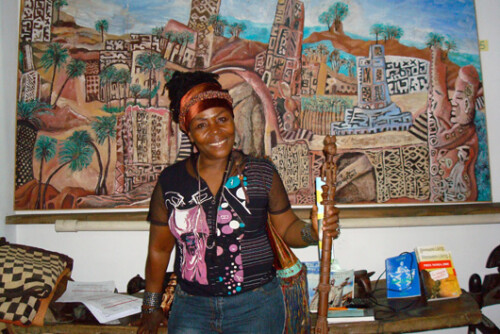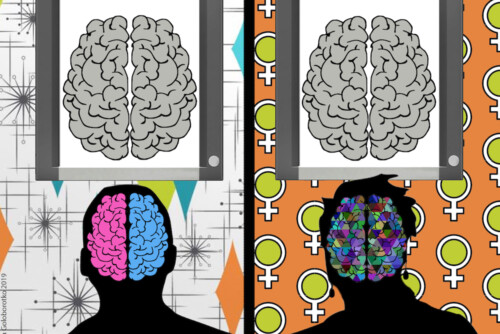V
When Naboro found him slumped in the chair the next morning, his head hanging over his chest, she thought he was still sleeping. She felt glad not to have to face him this morning, silently wishing he would sleep longer . . . and longer . . . and longer, maybe even forever. Then, and only then, would life return to normal. Then she would not have to endure his preaching about religion and drinking. She would remain her own person and live like before. She would block it all from her mind.
Still angry, she ignored him and drew open the curtains. She got the broom from the corner and started sweeping the floor. Layers of dust covered the room. As she swept past him, she prodded him with the broom but received no response. She left the room. The sun shone high in the sky when she stepped out, prompting her to shield her eyes from the blinding rays.
She kept on sweeping, taking on the entire compound. Then she heard her mother’s voice perforate the brick wall at which she bent down to gather debris. The intensity of the voice went straight through Naboro to her heart. She trembled. And when she recovered and stumbled to the house, the sight she beheld in the doorway transfixed her: kneeling over the man who was her father, her mother wailed and tugged at his chest, pleading with him to wake up . . . pleeease, wake up! His head hung forward, and foam formed around his mouth’s edges. His face, darkened, made him look like a burnt sculpture. Naboro felt nothing for the unconscious man she saw slumped in the chair. It was her mother’s distress that moved her, compelling her to run from the house, barefoot on the stony murram road all the way to the taxi stage, to hail a special taxi. As she ran, she heard the wretched sound of her mother’s voice, a mixture of hopelessness and fear. She also saw th e pained look on her mother’s face, contorted, disbelieving, and sad.
As if someone—or something—conspired to keep her from leaving, the taxi stage was empty. She paced up and down, biting her lips. She now regretted her thoughts from earlier this morning. Her mother had glowed the moment that man re-entered her life. Now this?
She did not know what to do. She needed a car immediately. She stared at the lock-up shop across the road. An MTN Publicom stood out against its yellow wall. She checked her pockets for coins and turned up nothing. With her eyes fixated on the booth, she darted into the road, not seeing or hearing the speeding car that screeched to a stop just in time. She kept going, not hearing the shaken driver’s abuse as she scuttled on. Jumping over the shallow trench filled with soil, dirty water, polythene bags, and juice boxes, she entered the shop and asked the attendant to let her use the phone. He looked up from his Red Pepper tabloid with disinterested eyes and continued chewing his gum. She raised her voice and asked to use the phone. She needed to make an urgent phone call, a man was unconscious, she needed a car, a friend had one—she spoke frantically and incoherently. The attendant held out his hand for the money. She shook her head.
“I don’t have any,” she told him. “It happened so fast. I’ll bring the money later.”
He shook his head.
“Nasser is ill. Very ill.” Until now, she hadn’t mentioned his name since he returned home from prison three months ago. The name performed miracles: the attendant gave her a phone card.
Sammy answered his cell on the first ring, as though he was awaiting her call.
“Please,” she pleaded. “Please come home. The man is ill. My mother is distressed. There are no taxis. Please come.”
Sammy listened to Naboro’s shaky voice. She never sounded like this. He said he would be there in a few minutes. He told her to wait at the shop. He would pick her up. She hung up and went around the door, handing the attendant the phone card. She thanked him again, to which he nodded indifferently and went back to reading his tabloid. Leaning against the wall waiting for Sammy, she hoped the man was still alive. And she prayed for her mother.
A loud hooting shook her from her reverie. Sammy waved, and she hurried to his grey Celica parked alongside the road. He leaned over and opened the passenger door.
“Thanks for coming,” she mumbled.
“Don’t mention it,” he grinned, starting the car. “How did it happen?” he asked absentmindedly. She did not answer.
Leaving a trail of dust, he drove fast. His cell rang. “I’m driving. Got an emergency on my hands. Will get back to you later, okay?” He hung up before hearing a response.
Naboro leaned back in the seat and closed her eyes. Her breathing was coming slowly. Sammy concentrated on the road ahead. It did not take long to get to the house, but Naboro fell asleep. He parked and gently nudged her, causing her to startle and hit her head.
“Sorry,” Sammy said.
“It’s okay.” She opened the car and jumped out, running to the house to find her mother in the same position, like a painted scene frozen in time.
“Mama,” she called, but her mother did not turn. She continued rocking the man and pleading with him to wake up. Naboro walked closer, putting her arm around her mother and whispering, “I have a car for us, mama. We can go to the hospital.” Her mother looked at her blankly through a tear-stained face.
“We need to move her,” Sammy said, coming over to help. They gently moved her aside and carried the unconscious man to the car. The mother followed closely, sobbing. Sammy got in the car, while Naboro and her mother cushioned the man between them, with the mother rubbing his shoulder, the daughter staring ahead, and the friend feeling the awkward silence, save for the mother’s muffled sobs.



